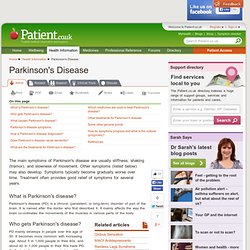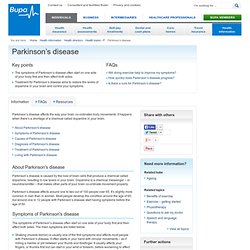

Jien min Jien? (2016) Il-moħħ (Maltese Language Documentary) MPDA. Livelife - Physical Rehabilitation Centre Malta. Parkinson’s disease is a chronic, progressive and disabling brain disorder known to affect about four million people worldwide.

What is known is that it is the result of degeneration of the nerve cells in the midbrain that consequently causes a reduction in the brain’s supply of dopamine. No-one knows its cause and, as yet, there is no known cure. Common Parkinson’s symptoms are tremors in the hands, arms, legs, jaw and face; rigidity of the limbs and body; slowness in movement; postural instability or damaged coordination and imbalance. Though there is no cure for the disease, if identified early it can be managed if treatment is immediately commenced. Treatment given to Parkinson’s Disease patients depends on the stage in which the disease has progressed. Parkinson's Movement. Parkinson's UK. Parkinson.org. Patient.co.uk. Parkinson's disease (PD) is a chronic (persistent, or long-term) disorder of part of the brain.

It is named after the doctor who first described it. It mainly affects the way the brain co-ordinates the movements of the muscles in various parts of the body. PD mainly develops in people over the age of 50. It becomes more common with increasing age. About 5 in 1,000 people in their 60s, and about 40 in 1,000 people in their 80s have PD. PD is not usually inherited, and it can affect anyone. A small part of the brain called the substantia nigra is mainly affected. If you have PD, a number of cells in the substantia nigra become damaged and die. The brain cells and nerves affected in PD normally help to produce smooth, co-ordinated movements of muscles. Slowness of movement (bradykinesia). The symptoms tend slowly to become worse. Some other symptoms may develop due to problems with the way affected brain cells and nerves control the muscles. PD is sometimes confused with other conditions. PDF - Parkinson's Disease Foundation.
Information from Bupa on parkinson’s disease. Parkinson’s disease affects the way your brain co-ordinates body movements.

It happens when there’s a shortage of a chemical called dopamine in your brain. About Parkinson's disease Parkinson’s disease is caused by the loss of brain cells that produce a chemical called dopamine, resulting in low levels in your brain. Dopamine is a chemical messenger – or neurotransmitter – that makes other parts of your brain co-ordinate movement properly. Parkinson’s disease affects around one to two out of 100 people over 65. Symptoms of Parkinson's disease The symptoms of Parkinson’s disease often start on one side of your body first and then affect both sides.
Shaking (muscle tremor) is usually one of the first symptoms and affects most people with Parkinson’s disease. As different muscles become affected you may develop: You may also get other symptoms that aren’t related to movement. These symptoms aren’t always caused by Parkinson’s disease but if you have them, see your GP. Medicines Surgery. Health communities. Guide4Living. Parkinson's UK - The support and research charity.
Parkinsons Disease Pictures: Tremors, Symptoms, and Treatments. EPDA home.